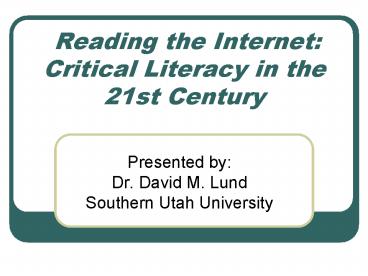Reading the Internet: Critical Literacy in the 21st Century PowerPoint PPT Presentation
1 / 20
Title: Reading the Internet: Critical Literacy in the 21st Century
1
Reading the Internet Critical Literacy in the
21st Century
- Presented byDr. David M. LundSouthern Utah
University
2
- Learning Conference 2006 The Thirteenth
International Conference on Learning - at the
Montego Bay Community College, June 22-25, 2006
3
The Media and Information
- Information growing geometrically
- Instant access
- Literacy has changed
- Navigating the maze
- The question
- How does one evaluate the information?
4
Goals for today
- Summarize current information regarding students
- Examine instruments that have been created for
website evaluation - Share instruments developed for website evaluation
5
Understanding todays students
- The same but different
- Three characteristics or Generation Y
- Grown up with technology, view it positively,
image orientation - Low tolerance for boredom, dont like to memorize
- Prefer active engaged learning
6
New technologies new literacies
- Commonplace methods of communication
- New sources of comprehensible information
- Some of the New Literacies
- Using search engines
- Evaluating accuracy
- Inferring what a hyperlink might contribute
- (Leu, Kinzer, Coiro, Cammack, 2004, p. 1586)
7
Leu Kinzer, 2003
- The Internet and other networked technologies
will become increasingly important to enable
individuals to access the best information in the
shortest time as they solve important problems.
8
Comprehension is more critical than ever 71
strategies
- Activating prior knowledge
- Monitoring comprehension
- Repairing comprehension
- Determining important ideas
- Synthesizing
- Drawing inferences
- Asking questions
- Navigating (new per Schmar-Dobler, 2003)
9
Internet text is different
- Non-linear when compared with traditional text
- Includes multi-media features
- It is often interactive
- Wikis
- Surveys
- Webquests
10
The nature of reading has changed
- Requires more critical thinking
- Requires recognition of purpose of media
- Readers read for different reasons
- Consequences of reading change
11
Readers understanding is enhanced
- More information provides broader perspective
- Cognitive and metacognitive abilities of
struggling readers enhanced - More challenging and often more authentic
learning - Increased motivation
- Information overload is possible
12
Changes the understanding of the social context
- World-wide, instant communication
- New opportunities for broadened cultural
understanding - Interaction with students from anywhere
13
Coiro (2003)
- I believe that some tasks on the Internet ask
readers to extend their use of traditional
comprehension skills to new contexts for
learning, while others, like electronic searching
and tele-collaborative inquiry projects, demand
fundamentally different sets of new literacies
not currently covered in most language arts
curriculums.
14
What is critical reading?
- Roe, Smith, and Burns (2005) say, Critical
reading is evaluating written materialcomparing
the ideas discovered in the material with known
standards and drawing conclusions about their
accuracy, appropriateness, and timeliness (p.
236).
15
What changes when critically reading the Internet?
- Valmont adds (2003) that, Literacy additionally
includes the active interpretation of nonverbal
symbolic systems that authors include in
electronic messages. It includes the writing and
speaking of verbal messages as well as the
construction of sounds images, graphics, photos,
videos, animations, and movements to add
nonverbal component to electronic messages
16
Critical reading specifics Roe, Smith, Burns
(2005)
- Author
- Purpose
- Point of view
- Style and tone
- Competence
- Material
- Timeliness
- Accuracy and adequacy
- Appropriateness
- Differentiation of fact and opinion
- Recognition of propaganda
17
Added specifics for the Internet Lund (2003,
2004)
- Navigability
- Links
- Getting lost
- Website readability
- Distracting media
- Easy to understand
18
Whats out there?
- CRAAP California State at Chico
- Currency
- Relevance
- Authority
- Accuracy
- Purpose
- Critical Reading Survey Lund
- Described previously
19
Proposed WebInfo Instruments
- Categories
- Criteria
- Numerical value likert-like scale
- Designed for specific grade levels (see handout)
- Adult/college/professional
- Secondary
- Elementary
20
Implications
- Critical reading the Internet is an important
skill - An efficient method is needed
- The proposed instrument allows baseline judgments
- More thorough examination of seemingly good sites
is warranted

